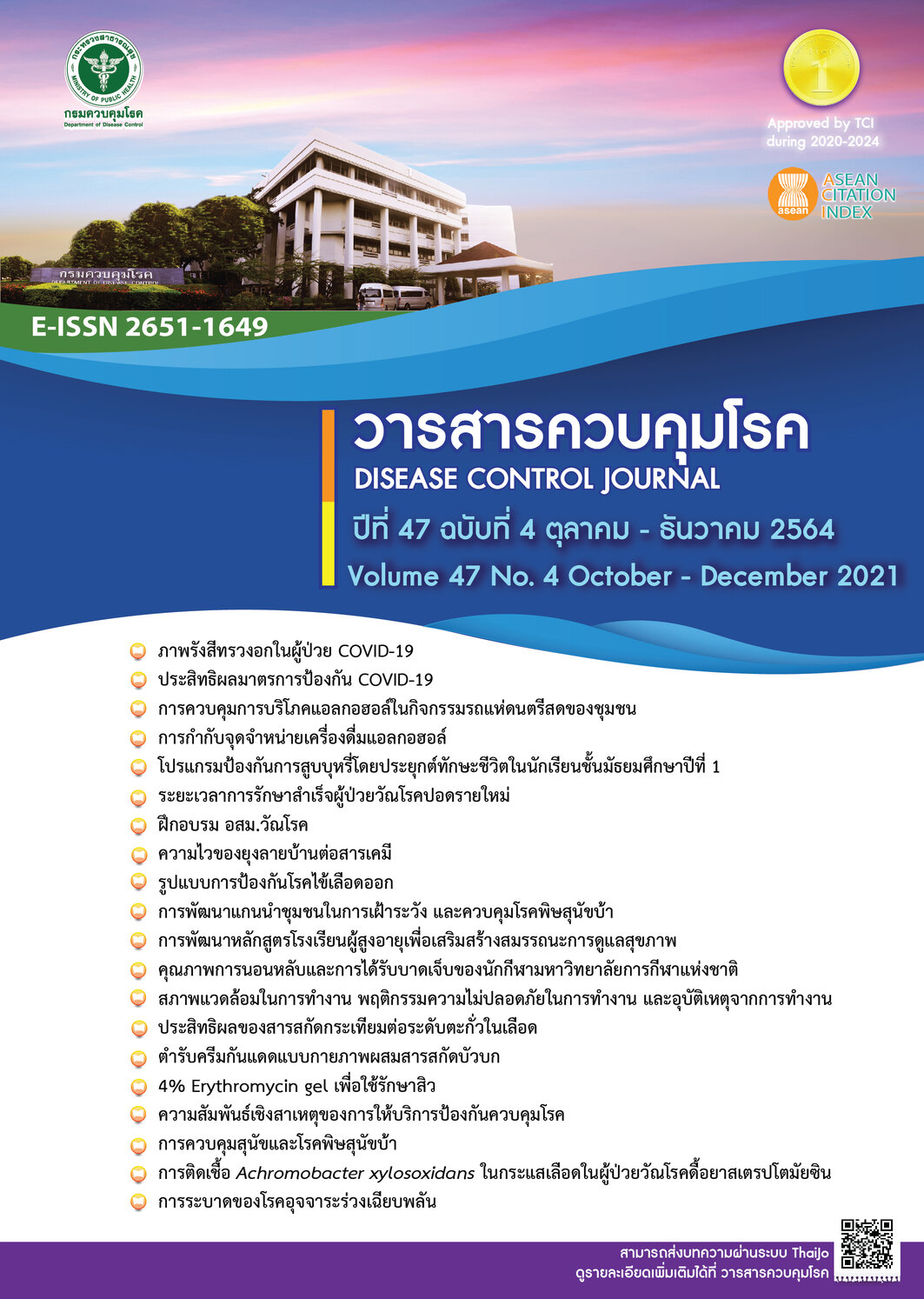Effects of smoking prevention program by applying life skills among student in seventh grade junior high school, Nakhon Nayok province
DOI:
https://doi.org/10.14456/dcj.2021.81Keywords:
A smoking prevention program, Life-skills, Seventh grade studentsAbstract
This quasi-experimental research, two group pretest-posttest design was aimed to examine the effects of smoking prevention program applying life-skills. The samples were 49 grade 7 students both male and female in Nakhon Nayok province, 27 in the experimental group and 22 in the comparison group. The study lasted for 8 weeks. Data collection was done on the 1st week and after the experimentation on the 8th week by using the self-administered questionnaire. Data analysis was performed by using descriptive statistics and inferential statistics in regard. The results showed that after the experimentation, the experimental group had significantly higher level of knowledge about the harms of smoking than before the experimentation and then the comparison group (p= 0.001 and p=0.024). No statistically significant difference was found either within the experimental group or between the experimental group and comparison group on anti-smoking attitudes, critical thinking skills, decision-making skills, and refusal skills (p>0.05). Refer to the anti-smoking behavior, there was no statistically significant differences between groups in the intention to not smoking at any time (p = 0.314). Almost of experimental group, 26 in 27 students (96.3%) and 19 in 22 students of comparison group (86.4%) were intention to not smoking at any time. Thus, the smoking prevention program, especially activities related knowledge about the harms of smoking can be applied with the target in the similar contexts.
Downloads
References
World Health Organization. Tobacco [Internet]. 2019. [cited 2019 Oct 23]. Available from: https://www.who.int/news-room/fact-sheets/ detail/tobacco
Action on Smoking and Health Foundation Thai- land. Toxins in cigarette smoke [Internet]. 2018. [cited 2019 Sep 23]. Available from: http:// www.smokefreezone.or.th/content_attachment/ attach/smoke.pdf (in Thai)
Foundation for the Development of International Health Policy (TH). Report of disease burden from Thai population risk factors 2014. Bangkok: Foundation for the Development of International Health Policy; 2014. (in Thai)
National Statistical Office. Population Smoking and Alcohol Behavior Survey. Bangkok: Nation- al Statistical Office; 2014. (in Thai)
Pittayarangsarit S, Pankrachang P. Report of Tobacco Consumption Statistics of Thailand 2018. Research and Knowledge Management for Tobacco Control, Mahidol University Bangkok: Charoen-Dee Man-Khong Kan Phim Printing house; 2017. (in Thai)
Bureau of Tobacco Control (TH), Department of Disease Control, Ministry of Public Health. Report of tobacco consumption among youths aged 13-15 years in educational institutions. Nonthaburi: Bureau of Tobacco Control (TH); 2015.
Muensuwan L. Report of the Thai Public Health smoking prevention program by applying life skills among student
in seventh grade junior high school Survey No.5, Bangkok: Health Systems Research Institute, Ministry of Public Health, Thai Health Promotion Foundation; 2014. (in Thai)
Kengganpanich M, Suwanrassami S, Phavaputa- nondh C, Kengganpanich T. Factors Associated with Smoking Behavior Among Female Adoles- cents in Bangkok Metropolitan. Journal of Health Education. 2014;37(3):29-44. (in Thai)
Pinata C, Banchonhattakit P. Effect of Health Education Program by Applying of Life Skills and Participatory Learning Process for Promoting Smoking Behavior Prevention among Students in a Secondary School. KKU-JPHR. 2013;6(1):29-36. (in Thai)
Kongphat A, Tantirattanawong K. The Effect of Self-Efficacy Reinforce Program for Smoking Prevention of Junior High School education at Koh sri bo ya Education Centre, Nua Klong district, Krabi Province. Journal of Community Health Development, Khon Kaen University. 2015;3(3):409-26. (in Thai)
Hanwang A. Application of Life Skills Promo- tion Program to Prevent Adolescent Smoking [thesis]. Graduate school Mahidol University, 2011. (in Thai)
Office of the Health Promotion Foundation. Smoke like burning your lungs, stop hurting yourself. Office of the Health Promotion Foun- dation. 2019;15:4-7.
Phinitdee P. Life Skills Enhancement Application for Preventing Smoking. In junior high school students, Si That District, Udon Thani Province Office journal Prevention and control of disease 6, Khon Kaen Province. 2015;22(2):11-20. (in Thai)
Naksomboon T, Kengganpanich M, Kengkan- panich T, Benchakul S. Effects of the Life Skills Development Program for Preventing Smoking of Prathomsuksa 5 Students, Wattana District. Bangkok Journal of Health Education. 2019;42 (2):184-94. (in Thai)
Benjakhan J, Waradisai K, Sripha S. Results of using the program. Life skills prevent smoking with junior high school students School case studies One of the province in Ubon Ratchathani. Isaan Journal of Pharmacy. 2017;13:476-88. (in Thai)
Doloh Y. Effects of Life Skills Development Program for Intentions of Non-Smoking in Muslim Community Youth, Ban Klang Subdistrict, Bang Toey District, Muang District, Phang Nga Province. [thesis]. Graduate School Mahidol University, 2017. (in Thai)
The World Bank. Strengthening Life Skills for Youth: A Practical Guide to Quality Program- ming [Internet]. 2014. [cited 2021 Apr 19]. Available from: https://iyfglobal.org/sites/de- fault/files/library/Strengthening_Life_Skills_ For_Youth.pdf.
World Health Organization. Life Skills Education School Handbook [Internet]. 2020. [cited 2021 Apr 13]. Available from: https://apps.who.int/ iris/rest/bitstreams/1276892/retrieve.
World Health Organization. Life Skills Education for Children and Adolescents in Schools [Inter- net]. 1997. [cited 2019 Oct 23]. Available from: https://apps.who.int/iris/handle/10665/ 63552
Ravindra P, Bosky S, Dharmendra S. Signifi- cance of Life Skills Education. Contemporary Issues in Education Research. 2017;10(1):1-5. 21.Fleiss L. Statistical Methods for Rates and Pro- portions [Internet]: 1981. [cited 2019 Oct 23]. Available from: https://www.scirp.org/(S (i43dyn45teexjx455qlt3d2q))/reference/Ref- erencesPapers.aspx?ReferenceID=1706808
Education Management Information System: EMIS. Basic information of schools under Nakhon Nayok [Internet]. 2019. [cited 2021 Apr 19]. Available from: https://data.bopp-obec. info/emis/school.php?Area_CODE=2601.
Jongnimitsatapohn P, Worranatsudatip N. Techniques for R-C-A questions and the devel- opment of life skills. Journalism, Khon Kean University. 2013;36(2):1-5. (in Thai)
Chanthamungkun C, Rachabut N, Rachabut S. Results of the capacity development program with Society to prevent smoking among youths in Ban Yang Sub-district, Muang District, Buriram Province. Journal of Sakon Nakhon Hospital. 2018;21(1):35-47. (in Thai)
Kaewsuttha N, Anchuen P, Somsuay P, Wirakun N. Effects of Non-Smoking Rejection Behavior Modification Program plus in elementary school dentistry Bangkok: Srinakharinwirot Research and Development Journal. 2017;9(17):53-68. (in Thai)
Downloads
Published
How to Cite
Issue
Section
License
Articles published in the Disease Control Journal are considered as academic work, research or analysis of the personal opinion of the authors, not the opinion of the Thailand Department of Disease Control or editorial team. The authors must be responsible for their articles.






